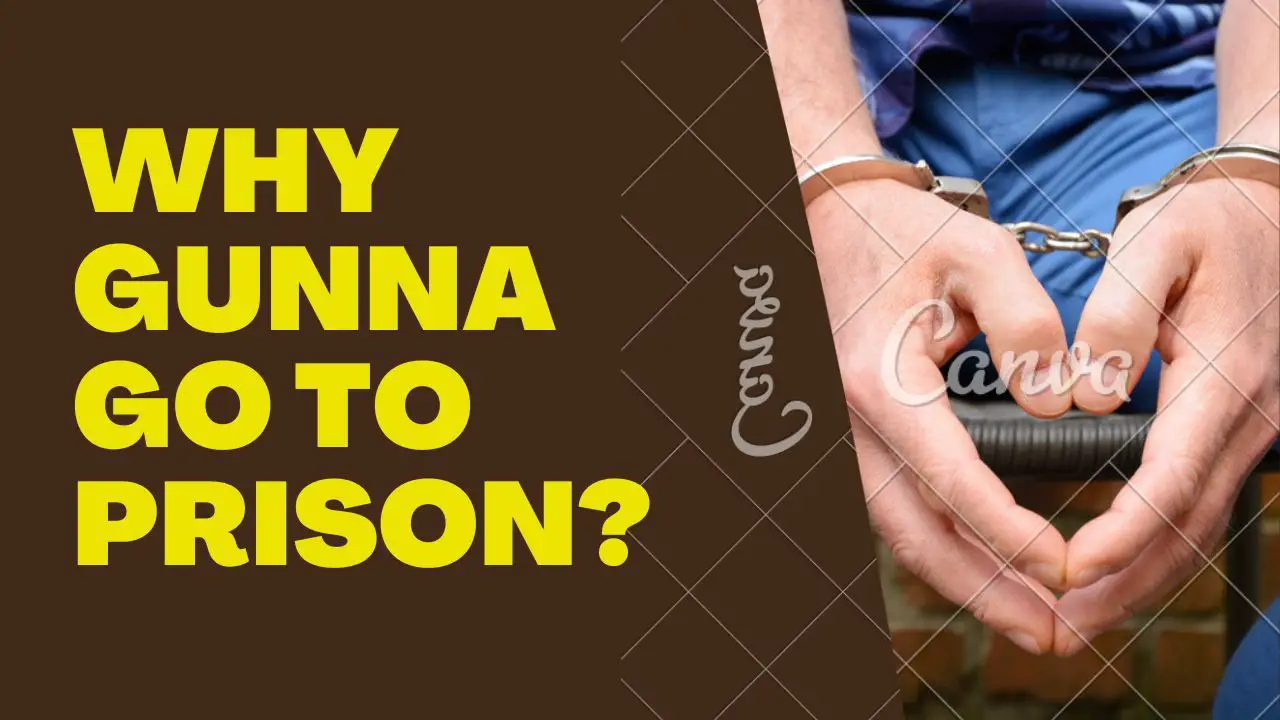Why Gunna Go To Prison? When Gunna Release From Prison
Why Gunna Go To Prison? In this article, we have discussed delving into the details of Gunna's case, why he went to prison, and what led to his release.

The world of hip-hop and music is no stranger to controversies and scandals. From feuds between rappers to legal disputes and criminal charges, it seems that drama is never too far away.
The case of Gunna, also known as Sergio Kitchens, is no exception. The Atlanta rapper was in legal trouble after being linked to the Young Stoner Life (YSL) record label and accused of criminal gang activity. After being released from jail after a guilty plea to a gang-related charge, Gunna recently made headlines again.
In this blog post, we will delve into the details of Gunna's case, why he went to prison, and what led to his release.
The Arrest and Charges: What Led to Gunna's Imprisonment?
Gunna's imprisonment came after his arrest in May 2022 as part of a law enforcement crackdown on gang-related activity. He was taken into custody among 28 people associated with Atlanta-based record label YSL Records. The federal prosecutors charged YSL Records as a front for organized crime, claiming the label was responsible for "75 to 80% of violent crime" in Atlanta.
Gunna was charged with criminal gang activity, and according to his defense attorney, Steve Sadow, he took an Alford plea to avoid a trial. Gunna's imprisonment was not a sudden event but was a culmination of his alleged involvement in gang-related activity.
The charges against him were serious and part of a larger crackdown on organized crime in Atlanta. The federal prosecutors accused YSL Records, founded by Young Thug, of being a front for criminal activity, which led to the arrest of Gunna and his co-defendants.
The charges against Gunna were related to his association with the record label and the alleged involvement in gang activity. Despite maintaining his innocence, Gunna chose to take an Alford plea to avoid a potentially harsher sentence at trial. The charges and his imprisonment may have impacted his music career, but Gunna's plans for the future show that he is determined to turn his life around and give back to his community.
YSL Records and Gang-Related Charges: How Was Gunna Involved?
Gunna's involvement with YSL Records, founded by Young Thug, ultimately led to his arrest and criminal gang activity charges. Federal prosecutors accused the label of being a front for organized crime and claimed that it was responsible for a significant amount of violent crime in Atlanta.
While Gunna maintains his innocence, he took an Alford plea to avoid a trial where he could have faced much harsher sentences. This plea allowed him to plead guilty without admitting to the crime he was accused of. Despite not considering YSL Records a gang, Gunna's association with the label and its alleged criminal activity led to his time behind bars.
The Plea Deal: Did Gunna Admit Guilt?
Gunna's decision to enter an Alford plea raises questions about whether or not he admitted guilt. Some may argue that a plea deal is essentially an admission of guilt, while others believe it's a strategic move to avoid a harsher sentence if found guilty in a trial.
Gunna maintains his innocence, stating that he only took the plea deal to avoid facing much harsher sentences in the trial. His statement also notes that he did not cooperate with prosecutors or make any statements against his co-defendants. It remains to be seen how this plea deal will impact Gunna's future in the music industry and whether or not he will continue to maintain his innocence in the face of legal troubles.
Read Bayside State Prison: Visiting Hours, Inmate Search, FAQ
Maintaining Innocence: Gunna's Statement on the Charges Against Him
In his statement, Gunna maintained that he did not consider YSL Records a gang but rather "a group of people from metro Atlanta who had common interests and artistic aspirations." He claimed that his focus on YSL was entertainment, and he wrote and performed music that exaggerated and glorified urban life in the black community. Gunna's statement also highlighted his intention to give back to his community and educate young men and women about the dangers of gangs and violence.
Gunna's statement about the charges against him further highlights the complexities of his legal troubles. Despite pleading guilty to a gang-related charge, he maintained his innocence and claimed that he did not consider YSL Records a gang. Gunna's statement speaks to a larger issue within the hip-hop community, where rap music and culture are often associated with gang activity and criminal behavior.
However, Gunna's focus on entertainment and artistic expression challenges this assumption and sheds light on the larger societal issues that the black community faces. His intention to give back to his community and educate young people about the dangers of gangs and violence is a positive step towards addressing these issues and creating a safer and more just society.
Young Thug's Trial: What Does it Mean for Gunna's Case?
Young Thug, also associated with YSL Records, is set to face trial next month on similar criminal gang activity charges. Gunna's case is separate from Young Thug's, but the outcome of the trial could have implications for Gunna's case. It remains to be seen how the jury's verdict will impact Gunna's sentence and whether he will be released early or have to serve his full sentence.
Although Gunna's case is separate from Young Thug's, the upcoming trial could have implications for Gunna's future. If Young Thug is found guilty of criminal gang activity, it could reinforce the prosecution's argument that YSL Records is a front for organized crime. This, in turn, could result in harsher sentences for Gunna and the other 28 individuals linked to the record label who were arrested in May.
Read Why is Suge Knight in Prison?
It remains to be seen how the jury's verdict will impact Gunna's sentence and whether he will be released early or have to serve his full sentence. As the trial approaches, the hip-hop world waits with bated breath to see what will happen to both Young Thug and Gunna.
Inhumane Conditions: Gunna's Lawyer's Emergency Motion for Better Treatment
Gunna's lawyer, Brian Steel, filed an emergency motion for better treatment for his client, citing the inhumane conditions that he was being held. The motion stated that Gunna was detained in "solitary confinement/total isolation." Steel claimed that Gunna had no access to media and no freedom to exercise, shower, or have human contact, making his time in jail even more unbearable. The motion requested a bond for Gunna, which was later denied, leaving the rapper to endure the harsh conditions for several more months.
Despite the denial of Gunna's bond request, his lawyer's emergency motion shed light on the inhumane conditions inmates face in many jails across the United States. Gunna's case highlights the need for prison reform and improved treatment of inmates.
Inhumane conditions such as solitary confinement, lack of access to necessities like exercise and hygiene, and lack of contact with the outside world can severely impact an individual's mental and physical health. Gunna's lawyer's efforts to bring attention to these issues serve as a reminder that the justice system needs to prioritize the well-being of its inmates and work towards creating a more humane and just system.
Release from Jail: Gunna's Return to Freedom
After spending months behind bars, Gunna was finally released from prison in December 2022. The release resulted from a plea deal he entered after being charged with gang-related offenses. Gunna, whose real name is Sergio Kitchens, had been held in an Atlanta jail along with 27 other people associated with the YSL record label, including fellow rapper Young Thug.
The label, founded by Young Thug, has accused federal prosecutors of being a front for organized crime responsible for a significant portion of violent crime in Atlanta. Despite maintaining his innocence, Gunna entered the plea deal to avoid a potentially harsher sentence if he went to trial.
Community Service and Rebuilding: Gunna's Plans for the Future
As part of his plea deal, Gunna has been ordered to perform 500 hours of community service, which will involve talking to young people about the hazards of gangs.
The rapper says that this will allow him to give back to his community and educate young men and women that "gangs" and violence only lead to destruction.
Gunna's plans for the future include rebuilding his life and career after his legal troubles. While his time in jail may have been a setback, it hasn't stopped Gunna from pursuing his dreams and making music that his fans love.
How Have Gunna's Legal Troubles impacted his Music Career?
Gunna's legal troubles haven't stopped him from making music, and his talent has continued to shine through even during his time in jail.
Despite facing criminal gang activity charges, Gunna's song "Pushin P," featuring Young Thug and Future, has been nominated for a 2023 Grammy.
While his legal troubles may have impacted his music career, it's clear that Gunna's talent and passion for making music have not been affected.
His fans continue to support him, and he remains a respected figure in the hip-hop community, with a promising future ahead of him.
Why Did Gunna Go To Prison Final Verdict
Gunna's legal troubles and eventual release from prison are a testament to the challenges faced by artists in the music industry. Despite maintaining his innocence, Gunna agreed to enter a guilty plea to avoid harsher sentencing at trial.
His experience behind bars highlighted the inhumane conditions faced by many incarcerated individuals, prompting calls for prison reform. However, Gunna's release and plans for community service show a commitment to giving back and promoting positive change.
As his music career continues, it remains to be seen how his legal troubles will impact his future success.
You can also read more related articles;
